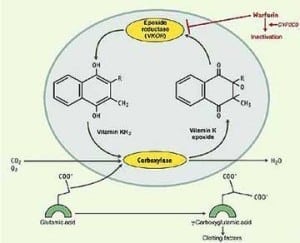 Dr. Allan Rettie, professor and chair of medicinal chemistry in the UW School of Pharmacy, Dr. Mark Rieder, research assistant professor in genomic sciences and their colleagues have identified a major genetic factor responsible for variability in patient responses to the commonly prescribed coumarin-based anticoagulant known as Warfarin. Warfarin, used to prevent harmful clotting after a heart attack, stroke or major surgery, is thought to be taken by over two million people a day in the US alone, yet dosage needs vary considerably between patients resulting in a challenge for their physicians. Rettie and his colleague’s research, supported by NIH funding, in genetic variation and the relationship this has to drug and dosage needs may enable physicians and pharmacists to more precisely medicate, thereby eliminating the negative effects of over- or under-medication. This field of study, known as Pharmacogenetics, is an important scientific pursuit at the forefront of the advancement of medical care. Read more about Rettie’s research in the June 2, issue of The New England Journal of Medicine or click on NPR interview.
Dr. Allan Rettie, professor and chair of medicinal chemistry in the UW School of Pharmacy, Dr. Mark Rieder, research assistant professor in genomic sciences and their colleagues have identified a major genetic factor responsible for variability in patient responses to the commonly prescribed coumarin-based anticoagulant known as Warfarin. Warfarin, used to prevent harmful clotting after a heart attack, stroke or major surgery, is thought to be taken by over two million people a day in the US alone, yet dosage needs vary considerably between patients resulting in a challenge for their physicians. Rettie and his colleague’s research, supported by NIH funding, in genetic variation and the relationship this has to drug and dosage needs may enable physicians and pharmacists to more precisely medicate, thereby eliminating the negative effects of over- or under-medication. This field of study, known as Pharmacogenetics, is an important scientific pursuit at the forefront of the advancement of medical care. Read more about Rettie’s research in the June 2, issue of The New England Journal of Medicine or click on NPR interview.